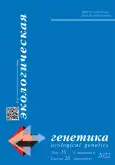Development of a testing system for regeneration regulators in Pisum sativum L.
- Авторы: Simonova V.Y.1, Kozlov N.V.2, Potsenkovskaia E.A.2, Tvorogova V.E.2, Lutova L.A.2
-
Учреждения:
- Sirius University
- Saint Petersburg State University
- Выпуск: Том 20 (2022): Спецвыпуск
- Страницы: 21-21
- Раздел: «ГМО: ИСТОРИЯ, ДОСТИЖЕНИЯ, СОЦИАЛЬНЫЕ И ЭКОЛОГИЧЕСКИЕ РИСКИ»
- Статья получена: 08.11.2022
- Статья одобрена: 11.11.2022
- Статья опубликована: 08.12.2022
- URL: https://journals.eco-vector.com/ecolgenet/article/view/112419
- DOI: https://doi.org/10.17816/ecogen112419
- ID: 112419
Цитировать
Полный текст
Аннотация
Pisum sativum L. (pea) is one of the most important agricultural crops, because its seeds have high protein content, and, due to its ability have symbiotic relationships with nitrogen-fixing bacteria, these plants need less fertilizers. Nevertheless, we are faced with the need to improve old and create new methods for obtaining novel varieties of peas and other agricultural plants. The formation of regenerated pea plants is difficult to achieve in the in vitro culture. Accordingly, transformation of this species is a laborious process. In this regard, the search for morphogenic regulators of somatic embryogenesis (SE) in pea is an urgent problem. A number of publications reported on the genes regulating the SE process in a model plant from the legume family, Medicago truncatula [1]. In our study, we search for the in vitro cultivation system in peas, suitable to test the effect of putative SE regulators in this species. We tested several pea transformation techniques using different explant variants: embryonic axes from mature and immature seeds, as well as shoot apexes. Out of the tested options, the transformation of mature seeds turned out to be optimal. We also designed a set of DNA constructs in silico, which are suitable for the search of morphogenic regulators in peas.
Полный текст
Pisum sativum L. (pea) is one of the most important agricultural crops, because its seeds have high protein content, and, due to its ability have symbiotic relationships with nitrogen-fixing bacteria, these plants need less fertilizers. Nevertheless, we are faced with the need to improve old and create new methods for obtaining novel varieties of peas and other agricultural plants. The formation of regenerated pea plants is difficult to achieve in the in vitro culture. Accordingly, transformation of this species is a laborious process. In this regard, the search for morphogenic regulators of somatic embryogenesis (SE) in pea is an urgent problem. A number of publications reported on the genes regulating the SE process in a model plant from the legume family, Medicago truncatula [1]. In our study, we search for the in vitro cultivation system in peas, suitable to test the effect of putative SE regulators in this species. We tested several pea transformation techniques using different explant variants: embryonic axes from mature and immature seeds, as well as shoot apexes. Out of the tested options, the transformation of mature seeds turned out to be optimal. We also designed a set of DNA constructs in silico, which are suitable for the search of morphogenic regulators in peas.
Об авторах
Veronika Simonova
Sirius University
Email: nikasimonova14@gmail.com
Student
Россия, SochiNikolai Kozlov
Saint Petersburg State University
Автор, ответственный за переписку.
Email: bionkbio@gmail.com
Student, Department of Genetics and Biotechnology, in field of “Molecular Biology and Agrobiotechnology of Plants”
Россия, Saint PetersburgElina Potsenkovskaia
Saint Petersburg State University
Email: epots556@gmail.com
PhD Student, Department of Genetics and Biotechnology
Россия, Saint PetersburgVarvara Tvorogova
Saint Petersburg State University
Email: v.tvorogova@spbu.ru
PhD, Senior Researcher, Department of Genetics and Biotechnology
Россия, Saint PetersburgLudmila Lutova
Saint Petersburg State University
Email: la.lutova@gmail.com
Doctor of Science, Professor, Department of Genetics and Biotechnology
Россия, Saint PetersburgСписок литературы
- Tvorogova V.E., Krasnoperova E.Y., Potsenkovskaia E.A., et al. What Does the WOX Say? Review of Regulators, Targets, Partners. Mol Biol. 2021;55:311–337.
Дополнительные файлы










